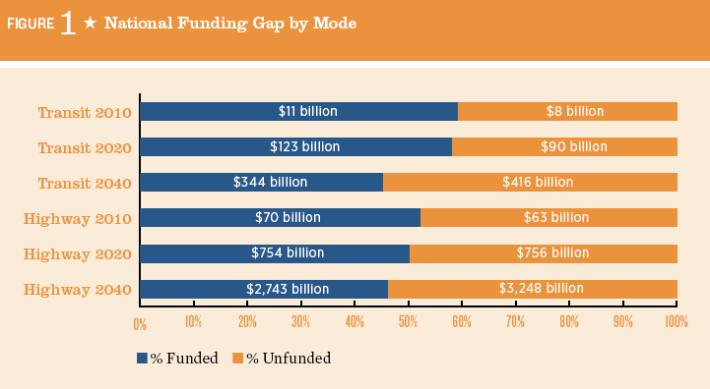Five months' groceries for a family of four. A year's worth of textbooks for a college student. One thousand sixty dollars: That's how much inadequate infrastructure spending cost the average American family last year, according to a new report from the American Society of Civil Engineers, "Failure to Act: The Economic Impact of Current Investment Trends in Surface Transportation Infrastructure." And it's only projected to get worse.
The country's roads, bridges and transit systems are deteriorating, but because of the gradual and diffused nature of the problem, the economic effects aren't easy to recognize, ASCE asserts.
But make no mistake: deferred maintenance costs American families and businesses dearly. Deteriorating roads do damage to private and commercial vehicles. Extra miles are driven to avoid congested roadways. Unreliable transit systems and commercial trucking routes force users to allot additional time in case of delay, undermining productivity.
All this added up to a four-figure price tag for the average U.S. family in 2010. That's a total of $130 billion for American families and businesses last year alone.
Looking ahead, things could get much worse, engineers report. If spending levels are held constant, by 2020, businesses would pay an extra $430 billion in transportation costs, household incomes would fall by $7,000 and U.S. exports would fall by $28 billion. This would be a tremendous blow to the economy. By 2040, losses in efficiency related to transportation investment are expected to directly result in the loss of 400,000 jobs -- and that's if spending levels are held constant, not reduced by a third, as Rep. John Mica (R-FL) has proposed.
The desire to reduce infrastructure spending in the midst of a debt crisis is understandable, but it will only make the crisis far worse. "You run a deficit both when you borrow money and when you defer maintenance that needs to be done," said former National Economics Council Director Larry Summers. "Either way, you're imposing a cost on future generations."
Plus, many experts warn that what would be a cheap fix now will be a costly overhaul if infrastructure is allowed to deteriorate beyond repair.
“This report should serve as a wake-up call to policy makers and politicians alike," said former Pennsylvania Governor Ed Rendell, co-chair of Building America's Future, a bi-partisan group dedicated to increasing investment in U.S. infrastructure. "The consequences of inaction are quite clear: Failure to make smart investments in our infrastructure will erode our nation’s economic competitiveness and leave an indelible mark on the quality of life for every American."






